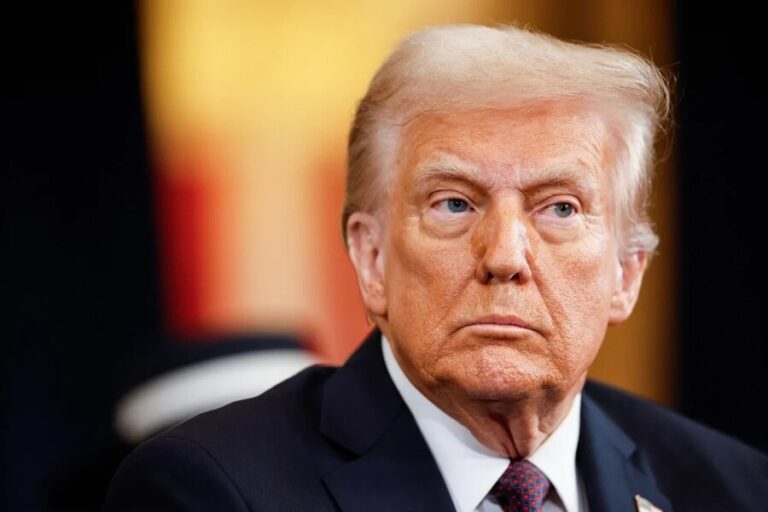President Donald Trump’s suggestion that the U.S. should “take over the Gaza Strip” has ignited backlash from Palestinian Americans and others with ties to the region. The controversial proposal, which includes relocating Palestinians to new homes outside of Gaza, has been met with disbelief and anger, particularly among Chicago’s Palestinian American community.
Trump’s remarks came amid ongoing tensions following a ceasefire agreement between Israel and Hamas. According to the president, the U.S. could potentially transform parts of Gaza into a “Riviera of the Middle East” by overseeing redevelopment efforts. For many Palestinian Americans, such rhetoric was both tone-deaf and deeply concerning.
“We want to preserve our identity through food, through art, through music, and also through us staying on the land that we believe is ours,” said Thaer Ahmad, an emergency physician and board member of the Palestinian American Medical Association. Ahmad emphasized that the focus should be on peace and stability rather than forced displacement.
Ahmad criticized Trump’s use of real estate metaphors to describe potential reconstruction in Gaza. “The people need peace, stability, and recovery,” he said. “What they don’t need is real estate terminology and talk of forcible transfer. There’s a word for that; it’s called ethnic cleansing.”
Trump’s plan also sparked renewed fears that the fragile ceasefire agreement could collapse. Under phase two of the deal, Palestinians expect increased access to essential supplies, including food, water, and medical resources. Advocates like Ahmad warned that political distractions could hinder efforts to bring much-needed aid to Gaza.
“It gets in the way of us treating people who will otherwise die if the circumstances on the ground don’t change,” Ahmad said. “If we don’t get in diabetes medicine, if we don’t get in blood pressure medicine if we don’t give them clean water, those people will die.”
For Palestinian American families like William Asfour’s, the situation is personal. Asfour has aunts, uncles, and cousins in Gaza who have already endured the destruction caused by the war between Israel and Hamas. He said his relatives are adamantly opposed to the idea of leaving their homeland.
“They didn’t survive all of this to be told they have to leave Gaza,” Asfour said. “They’re all against it. Nobody wants to leave.”
The uncertainty surrounding Trump’s comments has left many Palestinians in limbo. “This creates uncertainty within all of Gaza,” Asfour explained. “People don’t know, should we clean up? Do we rebuild? It’s causing a lot of anxiety.”
Asfour added that his family had already lost loved ones and possessions during the conflict. He believes that Gaza’s residents deserve the opportunity to rebuild without external interference. “Trump has campaigned on stopping wars and bringing peace,” he noted. “This plan contradicts that message.”
The White House attempted to downplay concerns about a U.S. military presence in Gaza. Press Secretary Karoline Leavitt clarified that while no formal decision has been made to send troops, the option remains on the table. Meanwhile, Secretary of State Marco Rubio sought to reframe Trump’s comments, suggesting that the U.S. might take responsibility for reconstruction efforts without a full-scale occupation. Rubio indicated that any relocation of Palestinians would be temporary and aimed at facilitating redevelopment.
Despite these reassurances, Palestinian Americans remain skeptical. Many argue that Trump’s plan overlooks the complex history and deep-rooted attachment Palestinians have to their land.
“The only people who should occupy the Gaza Strip are those who already live there,” Ahmad said. “We need to use the momentum from the ceasefire agreement to build a peaceful and prosperous future for the region.”
In the meantime, aid organizations and advocates continue to call for immediate action to address the humanitarian crisis in Gaza. With thousands of children malnourished and essential infrastructure in ruins, they stress that rebuilding efforts must prioritize basic needs over political maneuvering.
“Having these sorts of conversations detracts from how many kids are hungry and malnourished,” Ahmad emphasized.
For now, families like Asfour’s are holding on to hope that peace and recovery will prevail. But the uncertainty sparked by Trump’s remarks has left many feeling anxious about what the future holds for Gaza.
“People in Gaza have already lost so much,” Asfour said. “They deserve to be left alone to rebuild their lives.”
As the situation unfolds, Palestinian Americans in Chicago and across the country continue to voice their opposition to any plan that undermines their community’s hopes for self-determination and peace.
